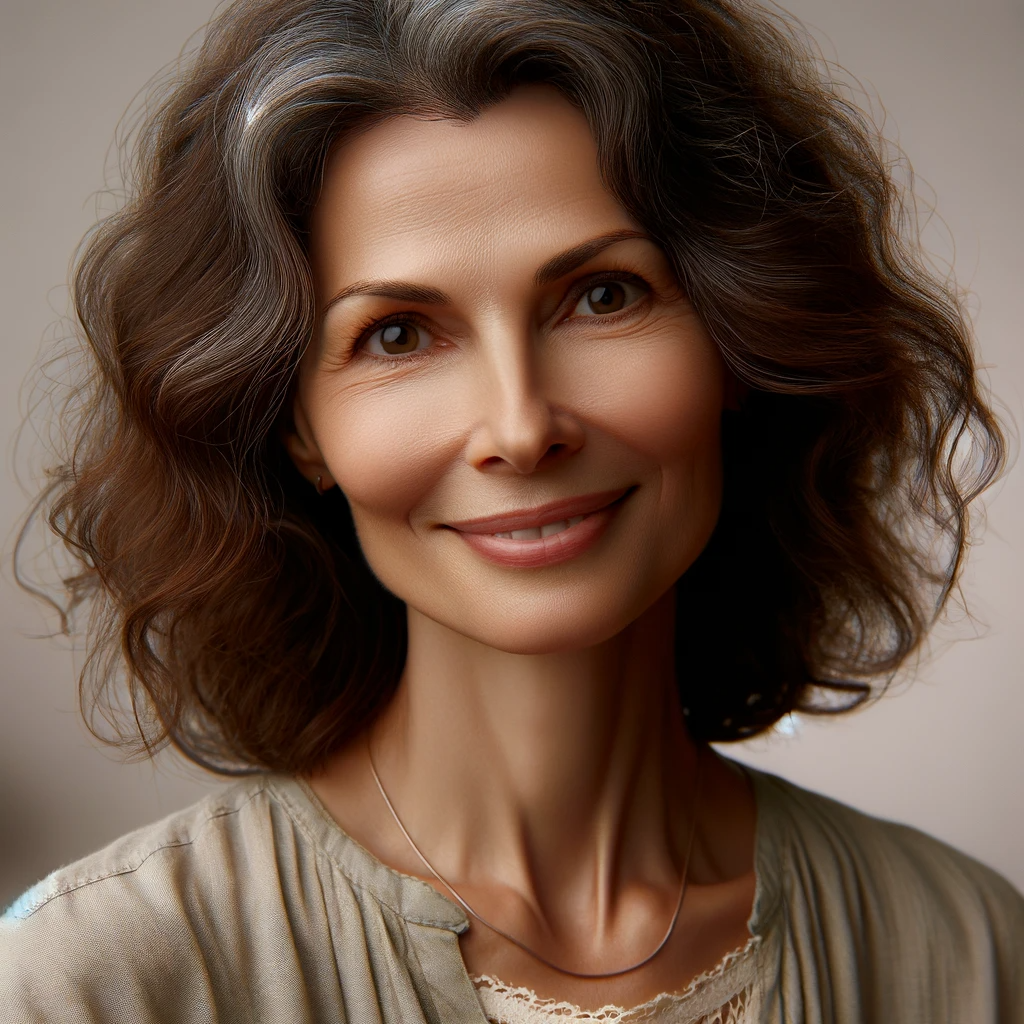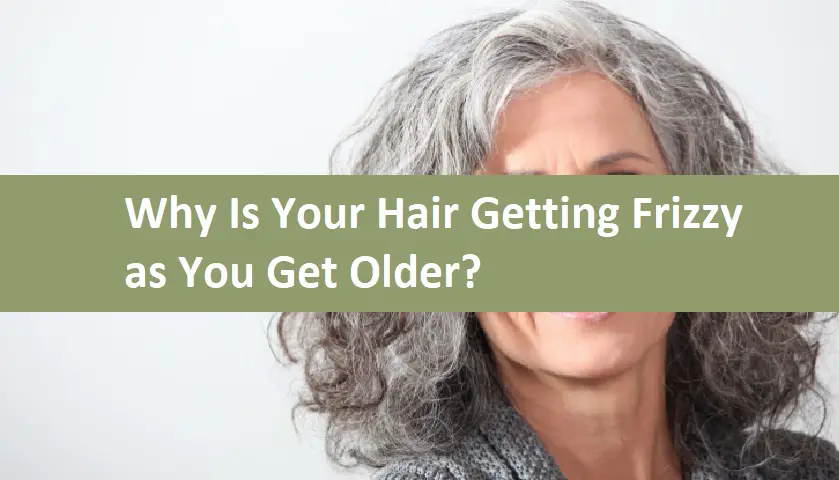In this article, you will learn everything about frizzy air and how to make it more healthy.
Whether you’re looking to make your dry hair smoother, revive aging hair, or simply maintain your hair’s health and vitality, there are many steps you can take to achieve your goals.
Keep reading!
Why Is Your Hair Getting Gray and Frizzy as You Get Older?
As we age, our hair undergoes several changes, including graying and frizziness. Gray hair occurs when the melanin-producing cells in our hair follicles stop producing pigment. The hair then becomes colorless, giving it a gray or white appearance. This is a natural part of the aging process and tends to happen more as we get older.
Frizziness, on the other hand, occurs when the protective outer layer of the hair, called the cuticle, becomes damaged or worn down. This can be caused by a variety of factors, including exposure to the elements, excessive heat styling, and chemical treatments.
Additionally, changes in hormone levels, particularly during menopause, can also contribute to hair changes, including graying and frizziness. Hormonal changes can cause hair to become dryer and more brittle, leading to increased frizz and breakage.
Overall, graying and frizziness are natural parts of the aging process, and while they can be frustrating, they are nothing to be alarmed about. Proper hair care, using gentle products, minimizing heat styling, and protecting hair from the elements, can help to minimize the effects of these changes.
Why Does Your Hair Get Dry as You Age?
Our hair naturally tends to become drier and more brittle. This is because the oil glands in our scalp produce less sebum, the natural oil that keeps our hair and scalp moisturized. Additionally, as we age, our body’s ability to retain moisture also decreases, leading to dryness in our skin and hair.
Another factor that can contribute to dryness in aging hair is damage from environmental stressors such as UV rays, pollution, and harsh chemicals in hair products. Over time, this damage can cause the hair to become weaker and more prone to breakage, leading to further dryness.
In addition to these external factors, internal factors such as hormonal changes can also play a role in hair dryness as we age. For example, women may experience changes in hormone levels during menopause, which can cause dryness in the hair and skin.
It’s important to use gentle, moisturizing hair products that are specifically designed for mature hair. Regular deep conditioning treatments can also help to hydrate and nourish the hair.
Additionally, protecting the hair from environmental stressors and minimizing heat styling can help to prevent further damage and dryness.
How to Make Your Dry Hair Smooth?
If you have dry hair, there are several things you can do to help make it smoother and more manageable.
Here are some tips:
- Use a moisturizing shampoo and conditioner: Look for products designed specifically for dry hair that contain hydrating ingredients such as argan oil, shea butter, or coconut oil. These ingredients can help to nourish and hydrate the hair, leaving it smoother and softer.
- Use a leave-in conditioner: Applying a leave-in conditioner after washing your hair can help to provide extra hydration and make your hair smoother. Look for a leave-in conditioner that is lightweight and won’t weigh your hair down.
- Limit heat styling: Heat styling tools such as flat irons and curling irons can damage the hair and make it more prone to dryness and breakage. If you do use heat styling tools, make sure to use a heat protectant spray to help minimize damage.
- Use a hair mask: Applying a hydrating hair mask once a week can help to deeply moisturize and nourish your hair, leaving it smoother and more manageable.
- Avoid harsh chemicals: Chemical treatments such as hair dyes and relaxers can damage the hair and make it more prone to dryness and breakage. If you must use these treatments, be sure to use a deep conditioning treatment afterward to help replenish moisture.
- Protect your hair from the elements: Exposure to the sun, wind, and cold weather can all contribute to dryness in the hair. Wearing a hat or scarf can help to protect your hair from these environmental stressors.
By following these tips and taking good care of your hair, you can help to make it smoother and more manageable, even if it’s naturally dry.
How to Revive Ageing Hair?
If you’re looking to revive aging hair, there are several things you can do to help restore its health and vitality.
Here are some tips:
- Use a gentle, sulfate-free shampoo: Look for a shampoo formulated specifically for aging hair, and avoid products that contain harsh sulfates that can strip the hair of its natural oils.
- Use a deep conditioning treatment: Applying a deep conditioning treatment once a week can help to replenish moisture and nourish the hair. Look for a treatment that contains ingredients like keratin, argan oil, or shea butter, which can help to strengthen and hydrate the hair.
- Avoid excessive heat styling: Heat styling tools like blow dryers, flat irons, and curling irons can cause damage to aging hair, making it more dry and brittle. If you must use heat styling tools, use them sparingly and always use a heat protectant spray to help minimize damage.
- Get regular trims: Trimming your hair regularly can help to remove split ends and prevent further damage. Even just a small trim can help to make your hair look and feel healthier.
- Eat a healthy diet: A healthy diet that’s rich in vitamins and minerals can help to support healthy hair growth. Foods like salmon, avocados, and nuts are all great sources of nutrients that can help to nourish your hair from the inside out.
- Stay hydrated: Drinking plenty of water can help to keep your hair and scalp hydrated, which can help to prevent dryness and breakage.
By following these tips, you can help to revive aging hair and restore its health and vitality.
Find Out What Supermarkets Offer Senior Discounts
If you are a senior and want to buy healthy food but don’t want to spend a lot of money, you can visit supermarkets that offer senior discounts. With these discounts, you can eat healthy food, have smooth and healthy hair, and save money!
Many supermarkets offer senior discounts as a way to provide extra savings for older customers.
However, the availability and terms of these discounts can vary depending on the store location and other factors.
Here are some examples of supermarkets that offer senior discounts:
| Fred Meyer | Fred Meyer offers a 10% discount to customers over the age of 55 on the first Tuesday of every month. The discount applies to most items in the store, but some exclusions may apply. |
| Publix | Publix offers a 5% discount to customers over the age of 60 on Wednesdays. The discount applies to all items except for alcohol, tobacco, and gift cards. |
| Safeway | Safeway offers a 10% discount to customers over the age of 55 on the first Wednesday of every month. The discount applies to all items except for milk, tobacco, and alcohol. |
| Harris Teeter | Harris Teeter offers a 5% discount to customers over the age of 60 on Thursdays. The discount applies to all items except for prescriptions, gift cards, and alcohol. |
Conclusion
In conclusion, as we age, our hair naturally undergoes changes that can lead to dryness, frizziness, and other issues.
By taking good care of your hair and using the right products and treatments, you can mitigate these effects and keep your hair looking and feeling healthy and vibrant.

Morgan Elfman is a compassionate writer, dedicated caregiver, and passionate advocate for senior well-being. Born and raised with a deep sense of empathy and a natural inclination towards service, Morgan has devoted her life to making a positive impact on the lives of seniors.
As a writer for www.choiceseniorlife.com, Morgan utilizes his skills to create insightful and informative content that addresses the unique needs and challenges faced by seniors and their families. Her articles not only provide valuable information on health, lifestyle, and care options but also strive to inspire and empower seniors to lead fulfilling lives.
